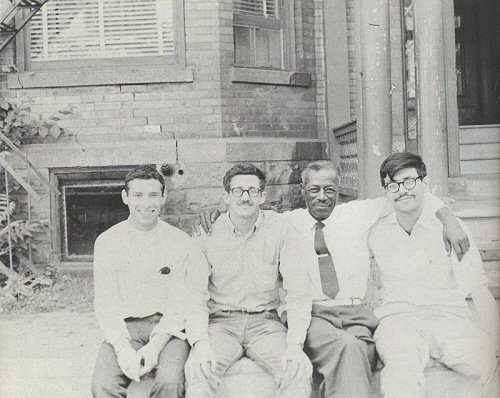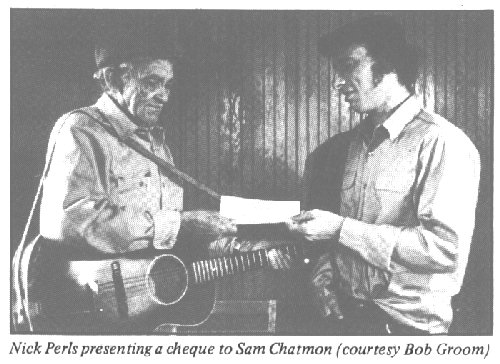J. Nicholas Perls
(4/4/1942 - 7/22/1987) Founder of Yazoo Records and Blue Goose Records (original) (raw)
"Among the newly developing American community of collectors, writers, and devotees, much of the serious study and appreciation of blues began in the Northeast - Boston, Philadelphia, Washington, D.C., but most of all, New York.
Larry Cohn recalled,
| We had a thing in New York called the Blues Mafia. We would have meetings at a different person's house every week. They were very loose, and the purpose was just to play records and really just have dialogue. Bernie Klatzko and Nick Perls and Charters for a period of time, Don Kent, most of the New York East Coast collectors. Pete Whelan, Steve Calt. I learned a lot from Pete Whelan certainly about country blues, and there was a guy named Jim McKune who was murdered who was like a grand doyen, if you will, and he was a real mentor. I mean he was listening to the Charley Pattons before any of us even knew who Brownie McGhee was. And then Washington had it's own collector's contingent, guys like Dick Spottswood, Bill Givens, a whole bunch of people. It was great fun."Lawrence Cohn: Nothing but the blues, p. 376 |
|---|
Son House "rediscovery" on June 23, 1964
Nick Perls, Dick Waterman, Son House, Phil Spiro
source: Eric von Schmidt & Jim Rooney: Baby, let me follow you down.
The illustrated story of the Cambridge folk years.- New York 1979, p. 194
photographer: Mrs. House using Dick Waterman's camera
Read what Gayle Dean Wardlow has to tell about the people (incl. Nick Perls) rediscovering the blues legends in the 60s.
Yazoo Records founder Nick Perls, whose specialty was 1920s and 1930s blues, was of the opinion, that 'Blues is dance music whether it's Charley Patton or Otis Redding or Blind Lemon Jefferson or James Brown. It's all dance music and it's all blues, the only difference is stylistic 'cause styles always change.' "
Lawrence Cohn: Nothing but the blues, p. 371

Nick Perls presenting a cheque to Sam Chatmon ("courtesy Bob Groom")
source: Juke Blues No. 10 (Autumn 1987), Editorial announcing Nick Perls' death on 22 July 1987
| NICK PERLSA Tribute MUCH like the early country blues music he loved, Nick Perls's death on July 22nd [1987] caused nary a ripple in mainstream American consciousness. Yet, Perls was invaluable in preserving a culture that wasn't a money maker. But it was the formative days of a musical art and he made it available on his Yazoo Records label. Most of Yazoo's indispensable albums (many bearing the cover illustrations by his good friend, underground artist R. Crumb) were compiled from rare 78 rpm recordings made in the 1920s by such singers and guitarists as Charlie Patton, Blind Willie McTell, the Memphis Jug Band, Blind Blake and Blind Lemon Jefferson. Yazoos's anthologies of jazz, blues and country music are also essential to any serious understanding of where American music comes from. Perls started Yazoo Records in the late '60s, an outgrowth of his first label, Belzona Records. He specialized in out-of-print recordings from the '20s. His family runs New York's prestigious art gallery, Perls, so he could enjoy his company without the usual bottom-line worries. And he indulged his love for music. A colleague remembers Perls once spending $20,000 to buy a single collection of 78s. A few months before he died, - a victim of AIDS at the age of 45 - Perls sold Yazoo to another esoteric label, New Jersey's Shanachie Records. Shanachie's Richard Nevins, a friend of Perls for 20 years, plans to continue Yazoo, keep its 74 titles in print, and revive it. "The label has been pretty low key for the past few years," Nevins said. "The idea is to greatly accelerate issuances and give Yazoo a higher profile." Soon Yazoo will publish its first book, a biography of blues singer Charlie Patton, written by Steve Calt, who was a regular writer of liner notes for the label's records. There will be a Patton album to accompany it. "There aren't a lot of records for Yazoo to issue. What is important is that they keep their records available, and Yazoo is very easy to obtain right now," Chris Strachwitz said, who owns El Cerrito's Down Home Music. One of Yazoos pet non-record projects was issuing boxed sets of trading cards (like baseball trading cards), with illustrations by Crumb. There are three boxes, one each on blues, jazz and country. Few of the artists featured on the cards were known to the general public. Perls's initiatives will be carried on. But he will be missed. His original initiative was an inspiration to other fans and record collectors, and to other independent record companies. | |
|---|---|
| Larry KelpThe TribuneOaklandCalifornia | printed in:Blues & Rhythm, The Gospel TruthNumber 33, December 1987, p. 15 |
| A PERSONAL APPRECIATION - NICK PERLSPresident of Yazoo and Blue Goose RecordsIt was with great sadness that I heard of the death of Nick Perls. I met Nick twice: first in 1972 while I was visiting Rev. and Mrs. Gary Davis, and then again in 1975 when my wife and I were on tour with Roy Bookbinder (whom Nick had recently recorded). During both visits Nick was most hospitable and very generous with his gifts of albums. Up until recently I had written to him many times asking for help and information about his albums and artists. He always replied and never refused to help. It was his kindness and generosity that I will remember most. His Yazoo albums were quite outstanding and his contribution to all aspects of the blues should not be understimated. I cannot think of a bad album but I can easily think of many exceptional ones, particularly, Big Bill Broonzy, 'The Voice Of The Blues', 'Mama Let Me Lay It On You', 'East Coast Blues', Guitar Wizards' and Rev. Gary Davis. His selection and taste were impeccable. He was broadminded in his choice and was also willing to record younger living blues and jazz performers including Larry Johnson, Jo-Ann Kelly, Woody Mann, Roger Hubbard and Roy Bookbinder. The last time I saw Nick was in his basement surrounded by the largest collection of records I had ever seen. He was playing a beautiful vintage Martin guitar, laughing and happy, close to the music he loved. | |
|---|---|
| Robert TillingJersey | printed in:Juke 11 (1987/88), p. 18 |